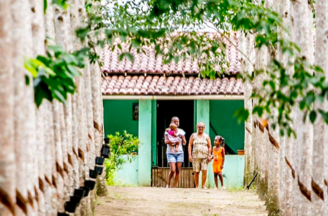Responsible Resilient Natural Rubber
Responsible Resilient Natural Rubber
Responsible Resilient Natural Rubber
Michelin is committed to a sustainable natural rubber supply chain that promotes sustainable development – one that protects the environment and supports the smallholders who are the core of the industry
Michelin is committed to a sustainable natural rubber supply chain that promotes sustainable development – one that protects the environment and supports the smallholders who are the core of the industry
Natural rubber is essential in a future where sustainable mobility is the norm. A renewable material harvested from the Hevea brasiliensis tree, natural rubber has many applications and is used in shoes, gloves and tires. With 85% of the global supply produced by smallholders, natural rubber production also contributes to sustaining the livelihoods of millions of farmers across the tropics.
The natural rubber industry has great potential to contribute to a climate-smart future, however, there remain challenges to overcome. The smallholder-dominant nature of industry, which in some countries can include a complex network of intermediaries between farmer and factory, makes it difficult to achieve visibility of risk in the supply chain.
Natural rubber is essential in a future where sustainable mobility is the norm. A renewable material harvested from the Hevea brasiliensis tree, natural rubber has many applications and is used in shoes, gloves and tires. With 85% of the global supply produced by smallholders, natural rubber production also contributes to sustaining the livelihoods of millions of farmers across the tropics.
The natural rubber industry has great potential to contribute to a climate-smart future, however, there remain challenges to overcome. The smallholder-dominant nature of industry, which in some countries can include a complex network of intermediaries between farmer and factory, makes it difficult to achieve visibility of risk in the supply chain.
On the ground, a few years of comparatively lower prices, coupled with poor productivity in some countries, has affected the livelihoods of some smallholder farmers, making it challenging for them to prioritize improvements in environmental and social practices.
Large-scale plantations have also occasionally been associated with deforestation risks and social issues. As one of the largest buyers of natural rubber, Michelin has a responsibility to tackle these challenges and effect a transformation in the industry towards more sustainable practices.
On the ground, a few years of comparatively lower prices, coupled with poor productivity in some countries, has affected the livelihoods of some smallholder farmers, making it challenging for them to prioritize improvements in environmental and social practices.
Large-scale plantations have also occasionally been associated with deforestation risks and social issues. As one of the largest buyers of natural rubber, Michelin has a responsibility to tackle these challenges and effect a transformation in the industry towards more sustainable practices.
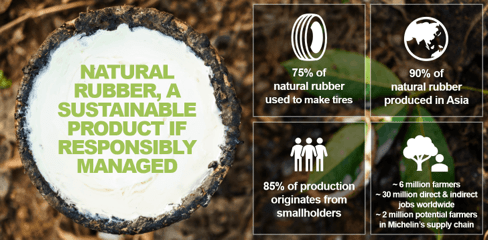
Large-scale plantations have also occasionally been associated with deforestation risks and social issues. As one of the largest buyers of natural rubber, Michelin has a responsibility to tackle these challenges and effect a transformation in the industry towards more sustainable practices.
OUR COMMITMENTS
Our Sustainable Natural Rubber Policy defines our commitments and guides our efforts to transform the supply chain. The first version of our policy was published in 2016, expanding on our natural rubber procurement policy undertaken in 2015. In January 2021, we revised our policy to align with the Global Platform for Sustainable Natural Rubber (GPSNR) policy framework. Our policy commits us to care for the environment, people, rubber farmers, natural resources and our stakeholders, and is now accompanied by our Sustainable Natural Rubber Roadmap 2020-2025 which will guide the implementation of these commitments. The first five years of our progress towards a sustainable natural rubber supply chain is captured in our Sustainable Natural Rubber Progress Report 2015-2020. Progress toward the implementation of our policy is reported on our Sustainable Natural Rubber Dashboard
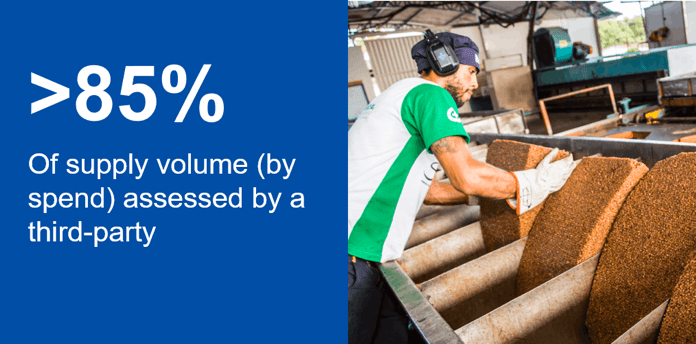
To help ensure that our natural rubber is sustainably sourced, Michelin engages and assesses our natural rubber supply chain, including our suppliers and their own supply chains. Michelin aims to assess a vast majority of its direct (Tier 1) suppliers through EcoVadis, a third-party global business sustainability ratings provider. EcoVadis assesses the maturity of actions and systems in four key pillars: Environment; Labor and Human Rights; Ethics and Sustainable Procurement. These assessments help Michelin to understand relative risk among its supply base and identify suppliers with weaker performance so that they can implement improvement plans. Michelin also conducts on-site checks, which will include environmental and labor aspects from 2021, on all individual natural rubber processing factories before they are added to an approved factory list, and on a regular basis afterwards
Michelin is also committed to ensuring that rubber produced on large-scale plantations is sustainably produced. To demonstrate a model for sustainable development of plantations that balance environmental, social and economic outcomes, Michelin developed a joint venture with Barito Pacific Group in 2015, PT. Royal Lestari Utama (RLU). The project sets aside 30% of its 88,761 hectare concession area for conservation and biodiversity to protect species like the Sumatran elephant. It also has comprehensive social initiatives to foster community livelihoods and ensure social issues are resolved in a fair and equitable manner. Michelin has long been engaged in conservation management through our operations in Bahia, Brazil through the 3,180 hectare Michelin Ecological Reserve, which preserves a significant remnant of the southern Bahian Atlantic rainforest and is helping scientists understand the role industrial rubber plantations can play in landscape matrix alongside conserved natural forest.
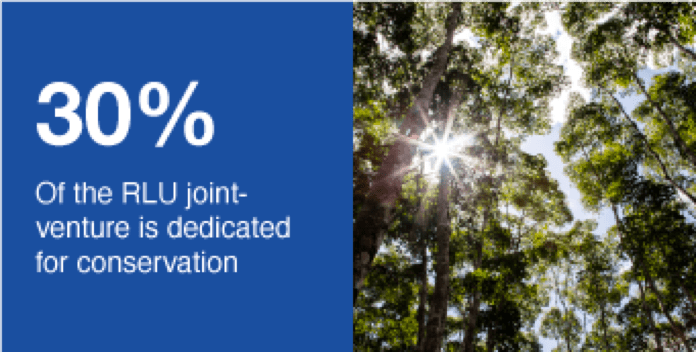
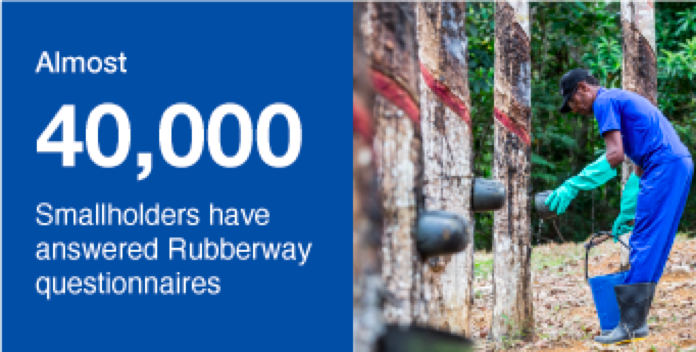
Developed to help tackle the challenge of fragmented and dynamic smallholder supply chains, Michelin created Rubberway®, a digital solution to assess and map social and environmental risks throughout the natural rubber supply chain. Central to the solution is the Rubberway application, which leverages a device readily available to most natural rubber processing factory staff and many farmers: a mobile phone. Using any web-capable mobile device, factories can engage with farmers, either directly in the field or through intermediaries, to have them answer a structured questionnaire that surveys them on environmental, social and agricultural practices.
Collected data is then visualized on a web dashboard, where responses are aggregated by jurisdiction. The resulting data allows us to understand assess risks in the supply chain and to prioritize jurisdictions for capacity building or risk-mitigation projects. Today, with almost 40,000 smallholder respondents, Rubberway is the most comprehensive database on smallholder farmers. In 2019, Michelin Group, Continental AG, and Smag announced the creation of a joint venture to further develop Rubberway as an independent solution for the industry
RESILIENT FARMERS
Michelin believes that responsible and resilient farmers are key to the success of a sustainable natural rubber industry, and is committed to empowering farmers to enable better livelihoods together with positive environmental and social practices. In partnership with our joint venture operations, with assistance from Michelin’s agricultural specialists, we have conducted 422,950 trainings for smallholder farmers in 2020. Going forward, Michelin is planning to deliver capacity building to smallholder farmers that need it most using the rich risk-mapping data from Rubberway, which is allowing us to identify priority jurisdictions for intervention. At the end of 2020, Michelin, with its partners, launched a project that will target smallholder farmers in the central Sumatra region. Named Project CASCADE (Committed Actions for Smallholders Capacity Development), the project aims to address sustainability risks linked to natural rubber production in the target communities through a holistic capacity building program that empowers farmers to adopt good practices. The project aims to address income generation, worker’s rights, health and safety, and environmental practices. It also hopes to create opportunities for livelihood diversification through intercropping and agroforestry models
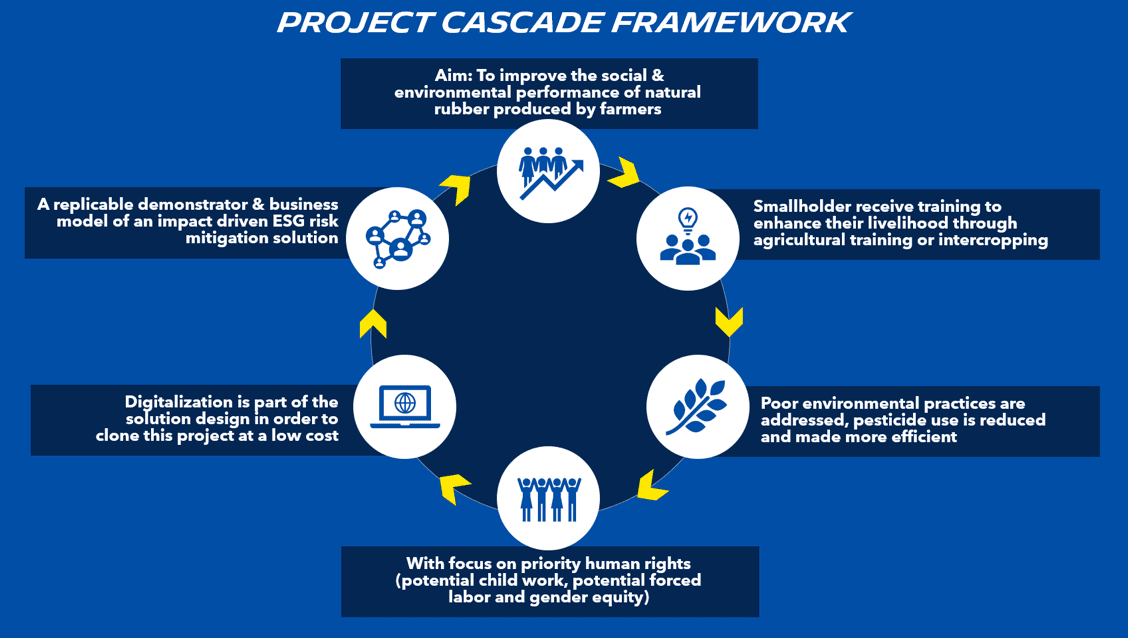
PARTNERSHIPS
Michelin believes that partnerships are essential to drive real change in the natural rubber supply chain. In 2015, Michelin and WWF France decided to work together to push the rubber market to adopt more sustainable practices. In 2019, following the achievement of key milestones, the partnership was renewed. A report has been published to detail progress achieved through the initial partnership and to describe objectives of the renewal.
Noting the need for a multi-stakeholder platform that involves actors from the whole supply chain, Michelin, with an international group of tire makers, car manufacturers, rubber processors and NGOs came together to launch “The Global Platform for Sustainable Natural Rubber” or GPSNR, in 2018. The GPSNR has a vision to create a ‘fair, equitable and environmentally sound natural rubber value chain’ and aims to improve the environmental and socio-economic performance of the natural rubber industry. The development of the GPSNR was initiated by the CEOs of the World Business Council for Sustainable Development’s (WBCSD) Tire Industry Project (TIP), of which Michelin is one of the founding members
OUR COMMITMENTS
OUR COMMITMENTS
Our Sustainable Natural Rubber Policy defines our commitments and guides our efforts to transform the supply chain. The first version of our policy was published in 2016, expanding on our natural rubber procurement policy undertaken in 2015. In January 2021, we revised our policy to align with the Global Platform for Sustainable Natural Rubber (GPSNR) policy framework. Our policy commits us to care for the environment, people, rubber farmers, natural resources and our stakeholders, and is now accompanied by our Sustainable Natural Rubber Roadmap 2020-2025 which will guide the implementation of these commitments. The first five years of our progress towards a sustainable natural rubber supply chain is captured in our Sustainable Natural Rubber Progress Report 2015-2020. Progress toward the implementation of our policy is reported on our Sustainable Natural Rubber Dashboard
Our Sustainable Natural Rubber Policy defines our commitments and guides our efforts to transform the supply chain. The first version of our policy was published in 2016, expanding on our natural rubber procurement policy undertaken in 2015. In January 2021, we revised our policy to align with the Global Platform for Sustainable Natural Rubber (GPSNR) policy framework. Our policy commits us to care for the environment, people, rubber farmers, natural resources and our stakeholders, and is now accompanied by our Sustainable Natural Rubber Roadmap 2020-2025 which will guide the implementation of these commitments. The first five years of our progress towards a sustainable natural rubber supply chain is captured in our Sustainable Natural Rubber Progress Report 2015-2020. Progress toward the implementation of our policy is reported on our Sustainable Natural Rubber Dashboard
RESPONSIBLE PROCESSING AND PRODUCTION
RESPONSIBLE PROCESSING AND PRODUCTION

To help ensure that our natural rubber is sustainably sourced, Michelin engages and assesses our natural rubber supply chain, including our suppliers and their own supply chains. Michelin aims to assess a vast majority of its direct (Tier 1) suppliers through EcoVadis, a third-party global business sustainability ratings provider. EcoVadis assesses the maturity of actions and systems in four key pillars: Environment; Labor and Human Rights; Ethics and Sustainable Procurement. These assessments help Michelin to understand relative risk among its supply base and identify suppliers with weaker performance so that they can implement improvement plans. Michelin also conducts on-site checks, which will include environmental and labor aspects from 2021, on all individual natural rubber processing factories before they are added to an approved factory list, and on a regular basis afterwards
To help ensure that our natural rubber is sustainably sourced, Michelin engages and assesses our natural rubber supply chain, including our suppliers and their own supply chains. Michelin aims to assess a vast majority of its direct (Tier 1) suppliers through EcoVadis, a third-party global business sustainability ratings provider. EcoVadis assesses the maturity of actions and systems in four key pillars: Environment; Labor and Human Rights; Ethics and Sustainable Procurement. These assessments help Michelin to understand relative risk among its supply base and identify suppliers with weaker performance so that they can implement improvement plans. Michelin also conducts on-site checks, which will include environmental and labor aspects from 2021, on all individual natural rubber processing factories before they are added to an approved factory list, and on a regular basis afterwards

Michelin is also committed to ensuring that rubber produced on large-scale plantations is sustainably produced. To demonstrate a model for sustainable development of plantations that balance environmental, social and economic outcomes, Michelin developed a joint venture with Barito Pacific Group in 2015, PT. Royal Lestari Utama (RLU). The project sets aside 30% of its 88,761 hectare concession area for conservation and biodiversity to protect species like the Sumatran elephant. It also has comprehensive social initiatives to foster community livelihoods and ensure social issues are resolved in a fair and equitable manner. Michelin has long been engaged in conservation management through our operations in Bahia, Brazil through the 3,180 hectare Michelin Ecological Reserve, which preserves a significant remnant of the southern Bahian Atlantic rainforest and is helping scientists understand the role industrial rubber plantations can play in landscape matrix alongside conserved natural forest.
Michelin is also committed to ensuring that rubber produced on large-scale plantations is sustainably produced. To demonstrate a model for sustainable development of plantations that balance environmental, social and economic outcomes, Michelin developed a joint venture with Barito Pacific Group in 2015, PT. Royal Lestari Utama (RLU). The project sets aside 30% of its 88,761 hectare concession area for conservation and biodiversity to protect species like the Sumatran elephant. It also has comprehensive social initiatives to foster community livelihoods and ensure social issues are resolved in a fair and equitable manner. Michelin has long been engaged in conservation management through our operations in Bahia, Brazil through the 3,180 hectare Michelin Ecological Reserve, which preserves a significant remnant of the southern Bahian Atlantic rainforest and is helping scientists understand the role industrial rubber plantations can play in landscape matrix alongside conserved natural forest.
RESPONSIBLE FROM FARM TO FACTORY: A JURISDICTIONAL RISK-BASED APPROACH
RESPONSIBLE FROM FARM TO FACTORY: A JURISDICTIONAL RISK-BASED APPROACH

Developed to help tackle the challenge of fragmented and dynamic smallholder supply chains, Michelin created Rubberway®, a digital solution to assess and map social and environmental risks throughout the natural rubber supply chain. Central to the solution is the Rubberway application, which leverages a device readily available to most natural rubber processing factory staff and many farmers: a mobile phone. Using any web-capable mobile device, factories can engage with farmers, either directly in the field or through intermediaries, to have them answer a structured questionnaire that surveys them on environmental, social and agricultural practices.
Collected data is then visualized on a web dashboard, where responses are aggregated by jurisdiction. The resulting data allows us to understand assess risks in the supply chain and to prioritize jurisdictions for capacity building or risk-mitigation projects. Today, with almost 40,000 smallholder respondents, Rubberway is the most comprehensive database on smallholder farmers. In 2019, Michelin Group, Continental AG, and Smag announced the creation of a joint venture to further develop Rubberway as an independent solution for the industry
RESILIENT FARMERS
RESILIENT FARMERS
Michelin believes that responsible and resilient farmers are key to the success of a sustainable natural rubber industry, and is committed to empowering farmers to enable better livelihoods together with positive environmental and social practices. In partnership with our joint venture operations, with assistance from Michelin’s agricultural specialists, we have conducted 422,950 trainings for smallholder farmers in 2020. Going forward, Michelin is planning to deliver capacity building to smallholder farmers that need it most using the rich risk-mapping data from Rubberway, which is allowing us to identify priority jurisdictions for intervention. At the end of 2020, Michelin, with its partners, launched a project that will target smallholder farmers in the central Sumatra region. Named Project CASCADE (Committed Actions for Smallholders Capacity Development), the project aims to address sustainability risks linked to natural rubber production in the target communities through a holistic capacity building program that empowers farmers to adopt good practices. The project aims to address income generation, worker’s rights, health and safety, and environmental practices. It also hopes to create opportunities for livelihood diversification through intercropping and agroforestry models
Michelin believes that responsible and resilient farmers are key to the success of a sustainable natural rubber industry, and is committed to empowering farmers to enable better livelihoods together with positive environmental and social practices. In partnership with our joint venture operations, with assistance from Michelin’s agricultural specialists, we have conducted 422,950 trainings for smallholder farmers in 2020. Going forward, Michelin is planning to deliver capacity building to smallholder farmers that need it most using the rich risk-mapping data from Rubberway, which is allowing us to identify priority jurisdictions for intervention. At the end of 2020, Michelin, with its partners, launched a project that will target smallholder farmers in the central Sumatra region. Named Project CASCADE (Committed Actions for Smallholders Capacity Development), the project aims to address sustainability risks linked to natural rubber production in the target communities through a holistic capacity building program that empowers farmers to adopt good practices. The project aims to address income generation, worker’s rights, health and safety, and environmental practices. It also hopes to create opportunities for livelihood diversification through intercropping and agroforestry models

PARTNERSHIPS
PARTNERSHIPS
Michelin believes that partnerships are essential to drive real change in the natural rubber supply chain. In 2015, Michelin and WWF France decided to work together to push the rubber market to adopt more sustainable practices. In 2019, following the achievement of key milestones, the partnership was renewed. A report has been published to detail progress achieved through the initial partnership and to describe objectives of the renewal.
Noting the need for a multi-stakeholder platform that involves actors from the whole supply chain, Michelin, with an international group of tire makers, car manufacturers, rubber processors and NGOs came together to launch “The Global Platform for Sustainable Natural Rubber” or GPSNR, in 2018. The GPSNR has a vision to create a ‘fair, equitable and environmentally sound natural rubber value chain’ and aims to improve the environmental and socio-economic performance of the natural rubber industry. The development of the GPSNR was initiated by the CEOs of the World Business Council for Sustainable Development’s (WBCSD) Tire Industry Project (TIP), of which Michelin is one of the founding members
Michelin believes that partnerships are essential to drive real change in the natural rubber supply chain. In 2015, Michelin and WWF France decided to work together to push the rubber market to adopt more sustainable practices. In 2019, following the achievement of key milestones, the partnership was renewed. A report has been published to detail progress achieved through the initial partnership and to describe objectives of the renewal.
Noting the need for a multi-stakeholder platform that involves actors from the whole supply chain, Michelin, with an international group of tire makers, car manufacturers, rubber processors and NGOs came together to launch “The Global Platform for Sustainable Natural Rubber” or GPSNR, in 2018. The GPSNR has a vision to create a ‘fair, equitable and environmentally sound natural rubber value chain’ and aims to improve the environmental and socio-economic performance of the natural rubber industry. The development of the GPSNR was initiated by the CEOs of the World Business Council for Sustainable Development’s (WBCSD) Tire Industry Project (TIP), of which Michelin is one of the founding members

 Link copied successfully
Link copied successfully
